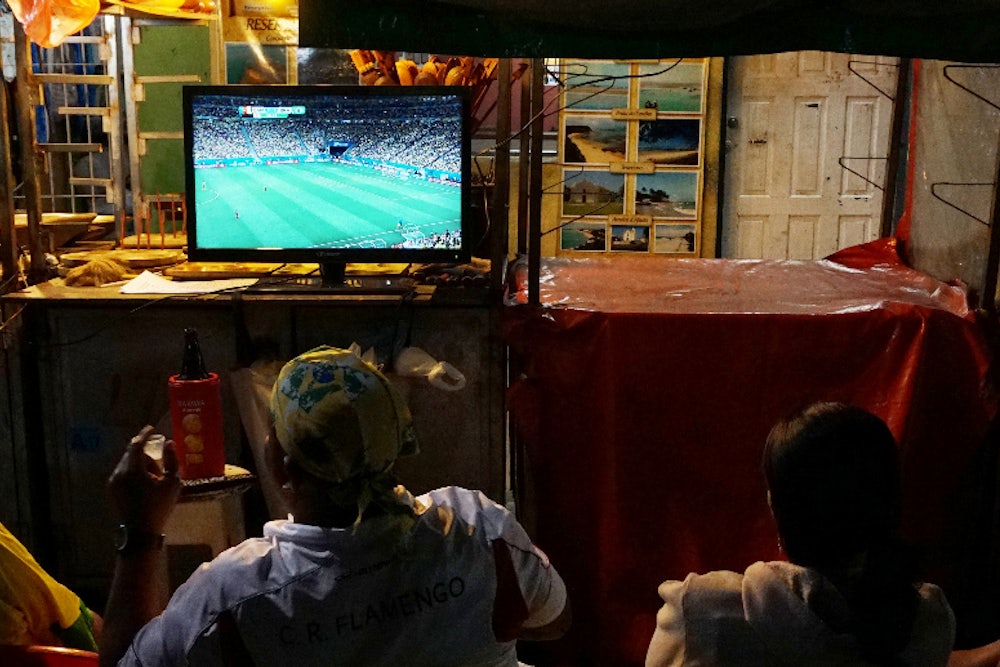This article originally appeared in Spanish, under the headline "El dilema de las transmisiones: Univisión, ESPN y la radio." Translation by Elaine Teng.
For this bilingual World Cup enthusiast, the beginning of each game requires a decision: watch the broadcast in English on ESPN (or sometimes on ABC), or in Spanish on Univision. I thought at first that what would make me choose one over the other would be a momentary preference for the agitation and drama associated with the Spanish broadcast or the calmness and restraint of the English broadcast. But later I realized it wasn’t that simple, that my choice was governed by darker motives that had to do with memory and the radio.
I realized that the difference between the two broadcasts has to do not only with the languages they use but also in their tolerances for silence. The ambient sound, the screams of the fans, and the exclamations of the coaches are much more present on Univision than on ESPN. On Univision, the narrator tends to tell us, in each instant, what we see: the names of the players and the destinations of the passes; the commentator on the American channel allows large stretches of time to pass without saying anything. The Univision commentators participate continuously with their particular Spanish—hyper-particular (because the types of football Spanish differ so much)—to joke or, more frequently, to analyze; the English-language commentators are parsimonious. There is a constant flow of speech and sound on the Hispanic channel that is missing on ESPN, where the broadcast serves to underscore subtly, very discreetly, almost reluctantly, a spectacle that is essentially visual. My corollary: Univision is much closer to the world of radio, whose methods it partly preserves.
My experience of football, like that of any Argentinian of my generation, began less through going to the stadiums than listening to the games. Radio transmission of football games is a special genre: radio must achieve the effect of presence through strictly auditory means. And it does this through various ways. One is, precisely, incorporating the sounds of the field. Particularly in the moment of the goal, the sounds of the stadium come to the forefront and share the space with the cry of the commentator.
It would be possible and very interesting to make an anthology of the goal cries of Latin American football commentators: it’s one of the great vocal genres of the region. The iconic commentators tended to (and I suppose, still do) have perfectly individual styles, perfected in innumerable occasions, of announcing the goals. They had to maintain the attention of the listeners, and so those cries were prolonged, prolonged like the cries of the fans with whom they were united in those moments. Many times we listened to those cries coming from a neighboring house or a passing car: they were moments of shared experience between those in the stadium and those of us here, in one particular spot on the planet, articulated by the interminable cry and the gasping of the commentator.
And after the cry came the analysis. Once the moment of resonance, euphoria, or dejection had passed, we needed to know how the play that we had had to imagine as we could related to the more global situation, the master plan of the game. The analysis was extensive and deep, and the responsibility of someone who wasn’t the commentator: a specialist, an expert, generally older, who adopted the manners of a sage. The Latin American pairs of commentator and analyst tended to be, and maybe still are, a little bit like great comic duos, pairs of clowns (the serious clown, the flamboyant clown), or married couples who have spent so much time together that they try to kill the monotony with a new meal or exchanges at once aggressive and funny. But that didn’t stop them from giving us indispensable information to imagine a game that we would never see, to build our own fiction of what was happening in a place we would never be.
There’s more, infinitely more, of this in the Univision broadcasts. When I choose to watch these broadcasts, the choice isn’t unconnected to the desire to return to that magical scene of a child listening to his team’s games on the radio. But suddenly a wave of uneasiness emerges. I lived, when I was still a boy, in Argentina during the 1978 World Cup hosted there. For one month, the popular unanimity, articulated by the narrators and analysts, included the leaders of the military dictatorship, and in a way, validated them. Around those stadiums were the torture centers. During this month the most frequent sounds in those torture centers would have been the radio broadcasts of the games. It’s probable that the pairs of torturers discussed with each other what they heard from the commentator-analyst pairs on the radio. I know that it’s unfair to the people who do the Univision broadcasts, but the horror that this association causes me is as atavistic as the comfort of the partial return to my childhood football scene. In these moments, I change immediately to ESPN and take refuge in another comfort—that of silence.
